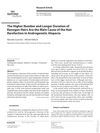Managing Cutaneous Manifestations of Hyperandrogenic Disorders
January 2002
in “
Treatments in endocrinology
”

TLDR Birth control pills help treat skin and hair growth problems linked to high male hormone levels.
The document from 2002 provides an overview of the treatment of hyperandrogenic disorders such as acne, seborrhea, hirsutism, and androgenetic alopecia using oral contraceptives (OCs). It explains that OCs, especially those with a high estrogen content or containing antiandrogenic progestogens like cyproterone acetate, are effective in reducing androgen production, increasing sex hormone-binding globulin, and decreasing free testosterone levels, which can improve these conditions. The document suggests that low-dose OCs are recommended for mild to moderate symptoms and for managing polycystic ovary syndrome (PCOS), while higher doses of cyproterone acetate may be necessary for severe hirsutism. It also notes that treatment must be long-term, as symptoms are controlled but not cured, with mild to moderate hirsutism disappearing after 36-60 cycles of treatment, and androgenetic alopecia responding best to at least 12 months of low-dose OCs. Alternative treatments like spironolactone, flutamide, or finasteride may enhance the effects of OCs. The document concludes that OCs are a key treatment option for hyperandrogenic disorders, offering benefits beyond contraception.














